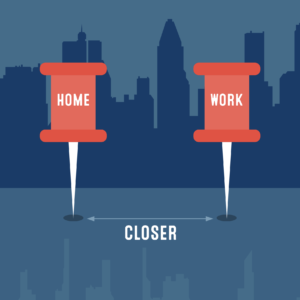The social, economic and geographic benefits of sharing a house
Thinking of moving into shared accommodation? If so, you could become part of a growing number of socially and economically savvy renters who are making house sharing a lifestyle choice rather than a necessity.
House sharing is on the up.
Cohabiting with a group of friends – or a group of total strangers – in a property that would otherwise be unaffordable is an ultra modern way of living.
But is it right for you?
Our Ultimate Guide will help you decide. It’s for anyone considering sharing a house.
And, should you wish to give it a try, check out our 10 Top Tips for House Sharing Harmony

The social aspect
Sharing a house isn’t for everyone.
If you are of the more introverted persuasion and you need to push the off switch now and again in your own little retreat, it may be all too much.
On the other hand, it could be just what you need to expand your social circle.
Many of our tenants end up becoming great friends with at least one of their new housemates.
If you’re slightly more extrovert in nature, thrive on social interaction and laugh in the face of silence, moving into shared accommodation may well fill up a lot more dates in your social diary.
If you’re about to fly the nest, you may well feel devoid of the possibility of home ownership.
You may also be willing to try anything other than the ‘stay with parents’ option.
Such a confident, social animal like you may well be at home in the rental market. And, more specifically, the house sharing market.
With house sharing, you’re never alone. There’s always someone on hand to share a meal with, share your concerns or discuss the pedestrianisation of your local City Centre! Whatever might float your boat.
It’s a great chance to meet new people outside your usual circle of friends.
Even Rupert Hunt, the founder of flatshare website, SpareRoom, posted an advert for wanted housemates.
He has a firm belief that the social benefits of house sharing far outweigh living alone.

10 top tips for house sharing harmony
Sharing a house with total strangers can be a great experience. It might even be one of the best things you ever do. And if you’re thinking about doing it, you certainly wouldn’t be alone.
Shared accommodation is becoming increasingly popular—with students and working professionals alike. Even people whose long-term aim is to ultimately become a home-owner are seeing the benefits of renting a room in the interim period.
If you do decide that house sharing is for you, here are 10 TOP TIPS that will help you get the best possible experience.

1. Respect your housemates
When you’re sharing a house, you need to get along with the people you live with. Embrace your commonalities and accept your differences. Respect each other’s privacy and belongings, and keep noise levels to an acceptable level.

2. Pull your weight
Be prepared to do your share of the chores. Remember, if you were in your own house, you would need to do the dishes, empty the bins, clean the bathroom and generally keep everywhere tidy. In shared accommodation, the same applies.

3. Socialise and make new friends
Moving into a house full of strangers can be quite daunting—but see it as a great opportunity. Find out your common interests – music, sport, soap carving (that really is a thing) – and talk about them over lunch. If you don’t happen to make friends, just keep it civil.

4. Pay your rent on time
It’s always best to set up a Direct Debit or Standing Order so that you don’t have to worry about paying your rent. If you pay monthly, however, remember that rent is a priority. The roof above your head is more important than your social calendar.

5. Remember, pets are not allowed
You love your furry or feathered friends and we get that. Alas, not everyone does. And worse than that, they have allergies towards them, which makes being around them intolerable. Pets are usually welcome in single lets but not HMOs.

6. Check the notice board regularly
Most shared houses will have a notice board in the communal area. This is where you’ll find a host of important stuff like electric certificates and emergency numbers but it’s also where landlords or agents usually leave crucial information that you need to know.

7. Your housemates’ food isn’t yours
Sharing a fridge will often mean that a deluge of temptation will await you every time you open the door. But, remember, food isn’t communal – so you can’t just help yourself to it. Also, the crockery and cutlery is for everyone, so don’t ‘collect’ it in your room.

8. Agree on a bathroom schedule
If you have an en suite, great. If not, sharing a bathroom may be the part of shared living that you’re most apprehensive about—but it needn’t be. Agreeing on a bathroom schedule that works for everyone will reap its rewards. Cleaning the bath regularly will also make the world a better place.

9. Report any maintenance issues
Maintenance work will need to be carried out in any house, let alone a shared one. Report any issues to your agent or landlord as soon as you can and they’ll send out an expert to deal with them. Light bulbs are usually your responsibility, though!

10. Report any disputes
Although the majority of people living in shared accommodation get on well with each other, relationships can sometimes break down. Agents and landlords want you to be happy in your new home, so tell them about any concerns as soon as they arise.

Go forth and share
Renting is increasingly becoming a smart lifestyle choice rather than a necessity. There are definite social and economic advantages to shared living not to mention the flexibility that it affords. Not everyone wants to own their own home or be tied to one place. Shared living offers a great alternative. But you just won’t know until you give it a try.

The economic aspect
Your ultimate aim may well be to own a property of your own. But renting is a good option in the meantime.
When you share a house, you only pay for the room, not the entire house. You can, therefore, save a substantial amount compared to paying a mortgage—and usually live in a better standard of house.
Plus, when you rent a room from an agency or private landlord, your bills are usually included.
Happy days.
You won’t need to be concerned about paying for utilities like gas, electric, water or broadband.
Better still, you won’t have to worry about asking meerkats or opera singers to help you find a good deal when the time comes to renew them. All that is taken care of.
Council tax will also be off your radar.

The geographical aspect
When you own your own home, you will usually need to commute to work. And that means owning a car is a must.
With house sharing, however, you’re not tied to a specific location.
That means you can generally find somewhere that is more geographically appealing in terms of your place of work—and is also within walking distance or on a bus route.
Landlords tend to opt for properties that they know will appeal to people working at local businesses or organisations.
And it’s certainly true to say that the majority of our student properties are right next to their respective university.
In some cases they’re literally across the road.
Convenience indeed.

The health aspect
Strange heading. What are the health implications of living in shared accommodation?
Well, it has been statistically proven that living with other people and being socially connected can have huge mental health benefits and even prolong life.
Living with other people, especially in a shared house, means that you will naturally – or even subconsciously – make more of an effort to chat and converse.
Sometimes it’s because you don’t want to appear ignorant and sometimes it’s because you just happen to be making breakfast together.
But either way, being socially involved helps ward off loneliness.

The conclusion
Sharing and renting as opposed to owning is now a way of life. And it’s not limited to housing.
Just think about the world around you at this moment in time.
We rent or lease cars as opposed to owning them. Car sharing is now a big thing to help save money—and the environment.
We stream films from media service providers like Netflix. We stream music from a huge selection of songs and playlists from the likes of Apple Music.
All these services are readily available without the need to go out and buy.
Society is changing.
You haven’t failed because you don’t own your own home.
With the average house price estimated to top the £400,000 mark by 2025 (yes, you read that right), house sharing is here to stay.

Thinking of co-living in Stoke-on-Trent?
HYPE Lettings is the biggest and most trusted shared accommodation specialist in Stoke-on-Trent. That’s because we care about our customers.
All our house shares come with your bills included. Your monthly rental fee includes all standard utilities.
It’s also good to know that we have a maintenance team. Should anything go wrong or need fixing in your property, someone will always be on hand to help.
Rent a room with confidence. Rent a room with HYPE.



